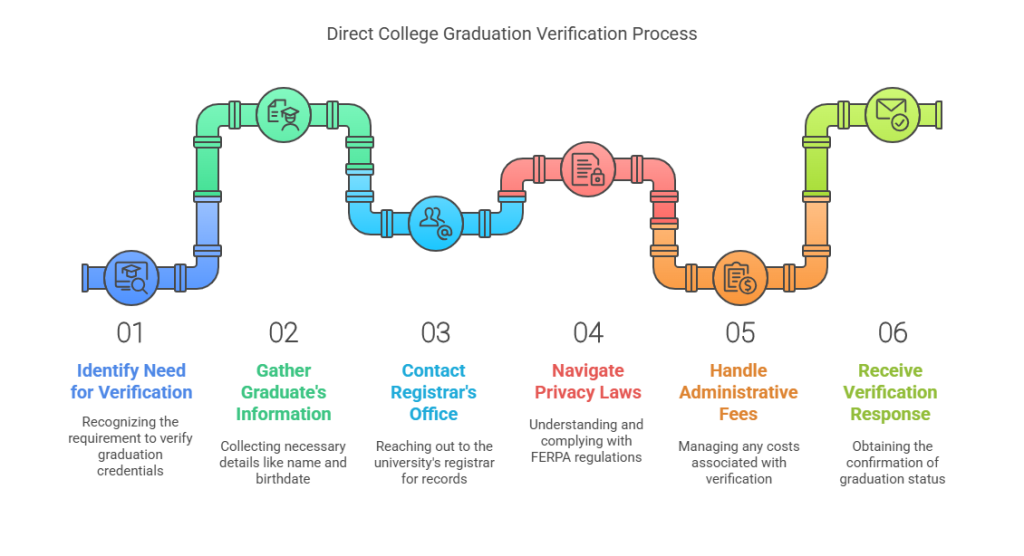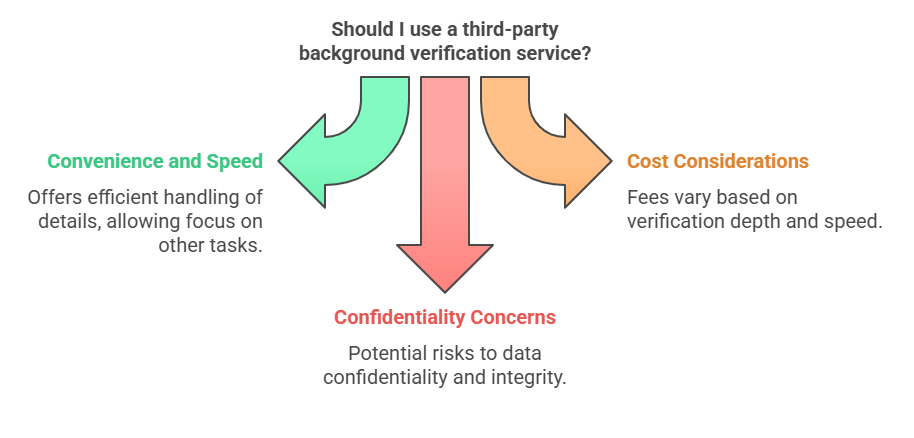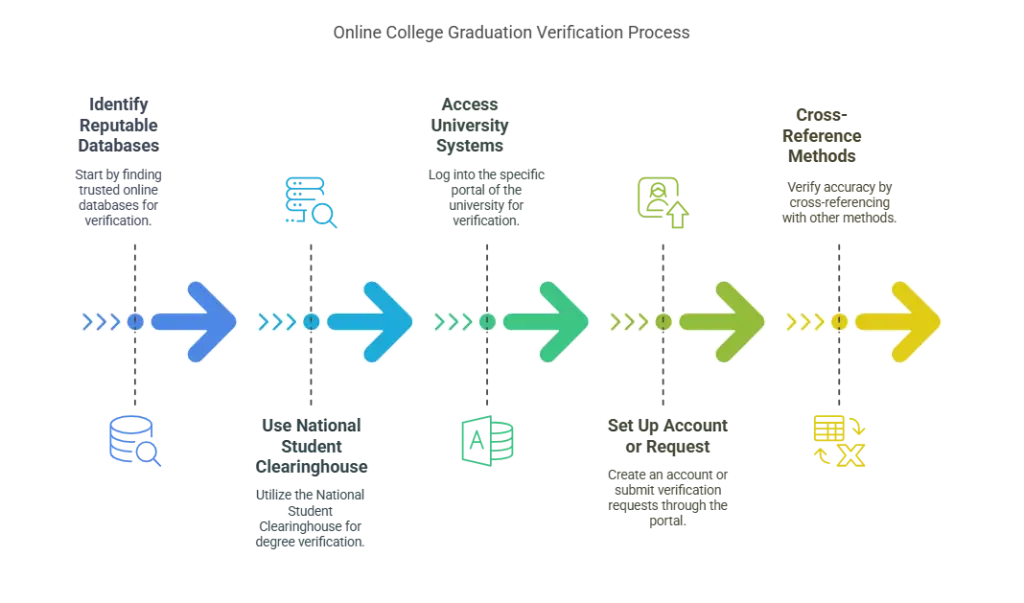Confirming someone's educational achievements is crucial, especially in today's competitive job market where credentials can significantly impact hiring decisions. Ensuring that a candidate holds the claimed college degree helps maintain trust and integrity in the professional environment. This guide will walk you through the process of how to check if someone graduated college, using both direct and third-party methods.
Key Takeaways
- College degree verification is crucial in maintaining trust and credibility in professional and academic settings by ensuring claimed credentials are authentic.
- Verification methods include direct contact with educational institutions, third-party services, and online verification tools, each with its own advantages and challenges.
- Legal and ethical considerations emphasize the need for consent and adherence to privacy laws, such as FERPA and FCRA, to avoid legal consequences.
- Preparing detailed information, documenting verification steps, and maintaining clear communication are practical strategies for a smooth verification process.
- Thorough and ethical degree verification is essential for fair outcomes and the prevention of errors, contributing to a trustworthy and competent professional environment.
Introduction
In today's competitive landscape, verifying a person's educational background is more crucial than ever. Whether you're an employer, an academic institution, or just curious, ensuring that someone has indeed earned their claimed degree can help maintain trust and credibility. Degrees often open doors to new opportunities and can heavily influence employment and collaboration decisions, making verification a vital step in the process.
Typical scenarios where such validation might be necessary include job interviews, college admissions, and professional licensing. By doing your due diligence, you protect not only your organization's interests but also create a fair playing field for all candidates.
In this guide, we’ll cover everything from direct verification techniques to third-party services, while also addressing legal nuances and practical advice. By the end, you will be equipped with a comprehensive understanding of how to navigate the world of college degree verification with confidence and ease.
The evolving job market teaches us that integrity is everything. Verifying a candidate’s educational background isn’t as easy as ticking a checkbox—it’s about practicing integrity while building a workplace rooted in trust and transparency. As members of the HR team, we must ensure that every claim a candidate makes is genuine and doesn't get misinterpreted. By conducting a bias-free background check, we maintain fairness and uphold the values that make our organizations thrive. Let’s not forget that fostering trust is as important as the skills our teams bring.
Understanding College Degree Verification
College degree verification involves confirming the authenticity and existence of a claimed academic credential. It is a critical part of an educational background check, serving as a safeguard against fraudulent claims. The process not only ensures that a candidate has the necessary qualifications but also helps maintain a level playing field where merit and honesty hold sway.
The primary purpose of diploma verification is to prevent fraud and deception in applications. Fake degrees and exaggerated educational claims can mislead employers, leading to hiring decisions based on false premises. Verifying these credentials ensures candidates are qualified for their roles, maintaining competence and trust within the workplace. Moreover, in sectors where safety and expertise are paramount, such as healthcare and engineering, degree verification protects not just the company's reputation but public well-being. In the end, a rigorous approach to verifying academic credentials underlines a commitment to integrity and excellence.
Methods of Verifying College Graduation
Ensuring the authenticity of a college degree is straightforward if approached methodically. This section covers the primary methods for checking whether someone actually graduated from college, offering a toolbox of strategies that can cater to various needs.
1. Direct Methods
When it comes to verifying someone's college graduation directly, reaching out to the institution they attended is often the most straightforward and reliable approach. You begin by contacting the college or university's registrar's office, which typically maintains all academic records. Before making a call or sending an email, gather necessary details: the graduate's full name, date of birth, and the years they attended. This information will help streamline your request and enable the registrar's staff to locate the records quickly.

However, be prepared to encounter a few bumps along the way. Privacy laws, such as the Family Educational Rights and Privacy Act (FERPA) in the United States, may restrict the release of a student's information without their explicit consent. This ensures personal data protection but can also slow down your verification process. To navigate these regulations, you might need to obtain written permission from the individual you're verifying.
Moreover, some institutions levy administrative fees for processing these requests, which can vary widely. It's also worth noting that responses might not always come swiftly; universities can be busy places, and requests like these, though commonplace, might not be prioritized ahead of current student needs. Despite these potential hurdles, direct verification remains one of the most precise ways to confirm someone's educational credentials.
2. Third-Party Verification Services
When it comes to verifying someone's college graduation, third-party verification services can be a savior for those short on time or resources. These companies specialize in conducting thorough educational background checks, taking on the legwork for you.

Overview of Services: These services access institutional databases and cross-check credentials for accuracy, providing you with a streamlined report. They are generally efficient and leverage strong industry connections to validate claims with minimal effort on your part.
Pros and Cons: The primary advantage of using third-party services is the convenience and speed—they handle the intricate details, letting you focus elsewhere. However, this convenience can come at a cost; fees vary depending on the depth of the verification and the processing speed you require. Additionally, you might have concerns regarding the confidentiality and integrity of the information shared with these providers.
Popular Services: Some notable names in the field include companies like GCheck, HireRight, and GoodHire. They offer a range of packages, detailing exactly what information they will verify and their typical processing times. It's worth familiarizing yourself with their service agreements and any limits on data accuracy guarantees.
To help you catch potential issues, it’s wise to review our blog post on "Background Check Red Flags", which provides valuable insights on what to watch for during the process. By staying informed, you can ensure the verification process remains as seamless as possible, while safeguarding against the pitfalls of misinformation or inflated claims.
3. Online Verification Tools
In today's digital landscape, online verification tools have become a convenient option for confirming someone's college graduation status. These tools often rely on databases that compile enrollment and degree information from educational institutions.

- Using Online Databases: Start by identifying reputable online databases that specialize in educational credentials. Websites like the National Student Clearinghouse in the U.S. provide a streamlined service for verifying degrees. You'll typically need the individual's basic information—like full name and date of graduation—to begin the search.
- Verification Systems: Many colleges and universities have implemented their own online verification systems. These platforms usually require you to set up an account or enter verification requests through a specific portal. It’s crucial to ensure you're accessing the official system to avoid misinformation.
- Common Pitfalls: While online tools offer quick and accessible options, they come with drawbacks. Relying solely on these resources may expose you to risks, such as encountering outdated databases or facing incomplete records. Always cross-reference with other methods when possible to ensure accuracy.
Online verification tools are a practical part of your toolkit, but they should not be your only resource. Combining them with direct verification methods can enhance reliability and credibility in confirming someone's educational background.
Legal and Ethical Considerations
When verifying someone's college degree, privacy and consent are paramount. It's crucial to respect the individual's rights by obtaining explicit consent before initiating the verification process. This not only adheres to ethical standards but is often a legal necessity. Without consent, you risk infringing on privacy laws, which can lead to legal ramifications.
The legal framework surrounding educational verifications varies by region, but generally, it falls under broader privacy and background check regulations. In the U.S., the Family Educational Rights and Privacy Act (FERPA) governs the release of educational records, meaning institutions may require specific permissions before disclosing any information. Employers should also be familiar with the Fair Credit Reporting Act (FCRA), especially when working with third-party verification services. The "FTC guidance" provides comprehensive advice on conducting background checks responsibly and in compliance with federal laws.
In cases where discrepancies arise between the claimed degree and verification results, handling them delicately is key. Begin by addressing the issue directly with the candidate, allowing them the opportunity to clarify any potential misunderstandings or inaccuracies. Miscommunications or clerical errors can sometimes explain discrepancies, and a straightforward conversation might resolve the matter. If inconsistencies persist, assess them in the broader context of risk versus reward while ensuring you stay fair and transparent throughout the evaluation process.
Practical Tips for Smooth Verification
Preparation
Streamline your verification process by gathering all essential information upfront. Make sure you have the candidate’s full name, date of birth, and any identifiers like a student ID number at the ready. Knowing the exact course of study, major, and graduation year can also cut down back-and-forth with institutions. Preparing these details keeps you organized and reduces delays.
Documentation
Document every step of your verification efforts. Keep records of communications—emails and phone call summaries—with institutions or third-party verifiers. This paper trail serves as evidence of your due diligence and a reference in case of disputes or discrepancies. Organize these records in a dedicated folder, either digitally or physically, for easy future access.
Communication
Establish clear and professional communication lines. When contacting universities, be concise and precise in your requests to avoid misunderstandings. Meanwhile, keep the candidate in the loop with polite updates, especially if delays occur. Approach the whole process with transparency to maintain positive rapport and trust with everyone involved.
Frequently Asked Questions (FAQ)
What should I do if the university is unresponsive?
Persistence is key. Start by checking the institution's official website for contact details beyond the registrar's office—like specific departmental contacts or administrative emails. If direct contact fails, try reaching out through social media or professional networks like LinkedIn, where institutional representatives may be more responsive. As a last resort, consider utilizing a third-party verification service that might have existing relationships with educational institutions.
How can I verify a degree from an international institution?
Verifying a degree from an overseas institution can be tricky. Begin by checking if the institution is recognized by your country's education authorities or international bodies like the UNESCO Global Recognition Convention. Contact the institution directly and request verification, keeping language differences in mind. Alternatively, enlist the help of a credential evaluation service that specializes in international academic evaluations to ensure accuracy.
Are there costs associated with degree verification?
Yes, there can be costs involved. Institutions may charge administrative fees for processing verification requests. Third-party services often come with service charges, which can vary based on the depth of the background check required. It's wise to budget for these potential expenses when planning your verification process.
What if the candidate claims the degree is from a defunct college?
If a candidate's degree is from a now-defunct college, the first step is to track down records, often managed by state education departments or successor institutions. Some accrediting bodies may also hold archived records. If these avenues are exhausted without success, consult with professional credential evaluators who might have access to historical data or alternative verification methods.
Can I verify someone’s college degree?
Yes, you can verify someone's college degree by contacting the institution directly or using a third-party verification service. Many universities provide verification services, and consent from the degree holder is often required.
How do you verify college degrees during a background check?
During a background check, potential employers may directly contact the educational institution or use specialized third-party companies to confirm a candidate's degree, dates of attendance, and any honors received. Verifications usually require authorization from the candidate.
How do employers verify education?
Employers typically verify education by contacting the educational institution's registrar or using reputable third-party verification services. They confirm the candidate's claimed degree, institution, and graduation date to ensure accuracy.
How long does it take to verify a college degree?
The time it takes to verify a college degree can vary, but it typically ranges from a few days to several weeks. Delays may occur due to institutional response times or the need for additional documentation.
What is the cost of verifying a college degree?
The cost of verifying a college degree varies based on the service provider and the specific requirements. It can range from $10 to $100 per verification. Some institutions may offer free verifications, but others might charge a fee.
Conclusion
Let's wrap up the key points we've covered. You've learned the vital methods for verifying college graduation, whether that's through direct contact with educational institutions, leveraging third-party services, or using online tools. Throughout the article, the emphasis has been on doing this diligently—not just to ensure that you have the correct information, but to maintain trust and integrity within your professional environment.
The importance of thorough verification can't be overstated. Cutting corners might save time initially, but could lead to costly and damaging errors down the road. Whether you're a hiring manager, an admissions officer, or just someone needing to confirm credentials, maintaining high standards in verification practices is crucial.
In the end, accurate verification isn't just about checking boxes; it's about fair outcomes based on truthful foundations. With the methods and insights provided in this guide, you can confidently navigate the process, ensuring each check is conducted ethically and effectively.
Resources
- National Student Clearinghouse Research Center. (n.d.). Research Center. Retrieved from https://nscresearchcenter.org/
- Federal Trade Commission. (n.d.). Background Checks: What Employers Need to Know. Retrieved from https://www.ftc.gov/tips-advice/business-center/guidance/background-checks-what-employers-need-know
- U.S. Department of Education. (n.d.). Family Educational Rights and Privacy Act (FERPA). Retrieved from https://www2.ed.gov/policy/gen/guid/fpco/ferpa/index.html

GCheck Editorial Team
Meet the GCheck Editorial Team, your trusted source for insightful and up-to-date information in the world of employment background checks. Committed to delivering the latest trends, best practices, and industry insights, our team is dedicated to keeping you informed.
With a passion for ensuring accuracy, compliance, and efficiency in background screening, we are your go-to experts in the field. Stay tuned for our comprehensive articles, guides, and analysis, designed to empower businesses and individuals with the knowledge they need to make informed decisions.
At GCheck, we're here to guide you through the complexities of background checks, every step of the way.






